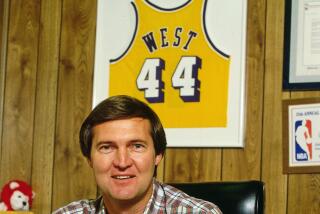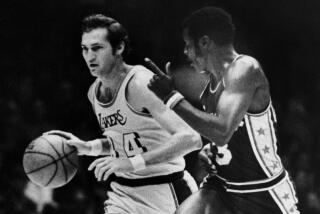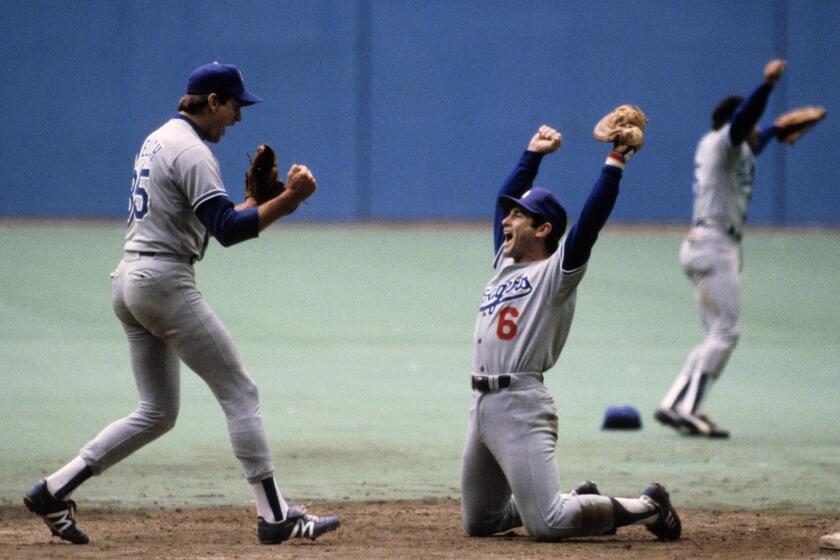An Air of Disaster
SALT LAKE CITY — The television ratings have never been this high. International interest is still rising. The NBA has its most compelling championship series in years. But the joy is somewhat restrained, and it has to be. It’s like the sunny day you have a hard time enjoying completely because storm clouds keep gathering in the distance.
When Commissioner David Stern gave what is, in essence, his state-of-the-league address here Thursday, it dealt far less with the here and now than it did with a labor clash that might lead to a work stoppage, and whether the league will continue to thrive without Michael Jordan.
While it would be anywhere from premature to preposterous to suggest that the NBA is facing a disaster, the league is confronting serious economic, cultural and social issues that threaten its stability.
In addressing the NBA’s reopening of the collective bargaining agreement and what could be a contentious work stoppage, Stern and Russ Granik, the league’s deputy assistant, said Thursday that the league is currently paying 57 percent of all revenues in salaries (as opposed to the desired 52 percent), which “is too high a percentage for the NBA to be profitable.”
Stern, in a separate conversation, added: “I’m willing to accept the players association’s numbers, that we’re going to break even this year. But that means losing money next year. If we have a league that is going to break even or lose money, that’s not a place I want to go.”
And that’s not the only issue the league is facing. Even a franchise such as the Washington Wizards, which has been jump-started economically by the completion of a new revenue-producing arena, finds itself confronting a decrease in players’ professionalism that threatens the quality of the product. Washington’s franchise isn’t alone, as evidenced by Latrell Sprewell choking his coach out in Golden State. But the Wizards’ general manager, Wes Unseld, is apparently the first team executive in the league to take a no-excuses approach publicly.
NBA and team officials love Unseld’s recent letter to Wizards season ticket holders in which he said, in part, “We share your disappointment in some of the players. Any time someone representing our organization is accused of violating a law, we take it very seriously. . . . We take our players’ behavior very seriously. We may choose to handle these situations in private, however I want to make sure that you know we did and will continue to use the most extreme measures possible. . . . No matter what I say or do this summer, it cannot erase the disappointment of us not being as successful as we would like. . . . “
Unseld’s suggestion that the only thing preventing him from handing out more serious fines was the collective bargaining agreement might have been the strongest part of the May 28 letter. The best scenario imaginable is for a Hall of Fame player to aggressively promise zero-tolerance of misbehavior. I would like to have seen Unseld (and others) take such a stance during the season when it was evident to most that some of his players needed a strong reprimand, but now is a whole lot better than never.
Unseld’s letter, though it might be unpopular with players (should they read it), is a bold, necessary step. Like the league, clubs have coddled players to the detriment of the product. Unseld’s fed-up sentiment may represent a fundamental shift that some have been quietly calling for. Remember, the NBA, in this latest negotiation with the players association, also is pressing for marijuana testing. The players association has resisted, but league and club executives remember serious drug problems that plagued the league in the 1970s.
It’s not like all these issues fell into the NBA’s lap overnight. But having one of the world’s most entertaining products, and indisputably the world’s most adored showman--Jordan--may have obscured them. “We know that eventually, if not sooner, Michael Jordan will be retiring,” Stern said.
If this seems like a lot, to be tying league’s future to Jordan, it is. Stern has been walking a tightrope all season, whenever the subject of Jordan’s importance to the league is broached. On one hand, he is lavish in his praise of Jordan, saying Thursday that the Bulls star is, “an extraordinary player of skill that may or may not be duplicated. . . . We will have been much the richer for the fact that the best player in the planet spent a number of years in our league.”
On the other hand, Stern brought with him a clip from a 1992 issue of Sports Illustrated, in which the author of a story on the NBA wondered how the league would survive the retirements of Magic Johnson and Larry Bird. Reading from the story, Stern said, “ ‘Can anyone replace them?’ Guess what? Somebody did . . . a whole group of players did.”
Asked if it is in the best interest of the league that Jordan continues to play beyond this series, Stern said yes. “But that was true of (Julius Erving), Bill Russell, Wilt Chamberlain. . . . It’s been an absolute joy with Michael. But I must tell you, it was a joy-and I mean this--to be with Dr. J. and it was a joy to be commissioner at a time when what you did in June was go from L.A. to Boston and back to L.A. again. . . . I think you know how I feel about Michael. But he was in the league . . . in ’92 when (Sports Illustrated) suggested that we would never fill the void and suggested that maybe Michael wasn’t enough.”
Problem is, it’s not just replacing Jordan that the NBA is now faced with. If there was labor peace, if marijuana use among young players wasn’t on the rise, if so many of the young stars weren’t underachieving, unprofessional and overhyped, then perhaps playing on without Jordan wouldn’t seem so daunting. The house was in much better order in ’92 when the league bid adieu to Bird and Magic.
But, one of the biggest assets the NBA has had all this time, in addition to Jordan, is Stern and his ability to forge compromise and utilize human resources to reach new heights. Jordan’s artistry through these profitable years has certainly obscured some recent erosion. But Stern, who was there to help set the table for the league’s glorious run these past 15 years, is going to have to guide the NBA through a period that appears will be anything but smooth.
More to Read
Go beyond the scoreboard
Get the latest on L.A.'s teams in the daily Sports Report newsletter.
You may occasionally receive promotional content from the Los Angeles Times.










